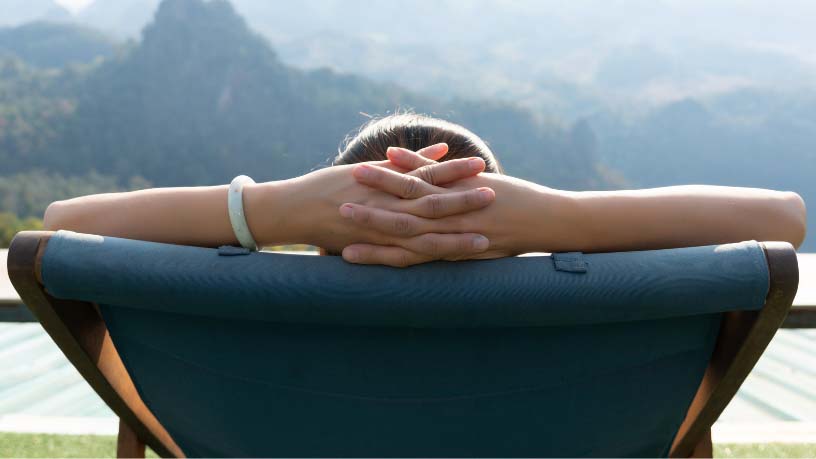Poor sleep can make your chronic pain worse, while chronic pain can make it harder to sleep.
On this page
Key takeaways
The sleep-pain cycle affects many people. Understanding the relationship is a powerful step in breaking it.
Discover expert techniques for improving your sleep.
Chronic pain (pain that persists for more than 3 months or beyond the expected healing time) affects one in 5 Australians over the age of 45.1
It’s something that you can live with most (if not every) day of the week, and it can affect everything from your physical to mental health.2
Chronic pain is also something that can significantly affect your sleep, and there’s a 2-way link between chronic pain and sleep that can quickly spiral into a vicious cycle.
Here, we look at the relationship between chronic pain and sleep, plus what you can do to help break the cycle.
The painful truth about sleep and pain
According to one study, up to 88% of people living with chronic pain experience sleep problems, while around 50% of those with insomnia report having chronic pain.3
Sleep is a time for rest and recovery. It’s a chance for every system in your body to reset and recharge for the day ahead.
Pain can make sleep far more challenging, and a rough night’s rest can, in turn, increase your pain levels the next day. Adding to that, the stress of not being able to sleep can create a snowball effect, making things worse over time.
The link between sleep and pain
Bupa Physiotherapist Linsay Newman says that, while it’s not completely understood how poor sleep increases pain, the link may potentially lay in the interaction between sleep and the immune and nervous systems, which can lead to inflammation for those living with chronic pain.4
“If you’re not sleeping well, it [can] make the immune system and the nervous system more sensitive, and therefore more sensitive to pain,” says Newman.
Adding to this, your nervous system needs to wind down in order for you to fall asleep.5 But if you’re dealing with chronic pain, your nervous system is likely in a more active, heightened state.6
Breaking the sleep-pain cycle
Newman says that it’s important to tackle the sleep-pain issue holistically.
“We talk a lot about sleep when treating chronic pain because it’s a fundamental building block,” she says. “That's what's fuelling our body and our nervous system, so we need strong foundations that are consistent.”
One way to break the cycle, Newman recommends, is through exercise.
“When you exercise in the day, you're going to be more likely to fall asleep when you go to bed,” she says. “When you’re not doing as much during the day, that affects your mental health, your pain levels and your ability to fall asleep.”
If exercise has added to your chronic pain in the past, Newman advises starting off slowly and finding activities that work for you to gradually (and safely) build up strength and endurance.
“Slowly increase or adapt what you’re doing without flaring up the pain,” she says.
It’s also important to not overdo it. “Sometimes, people do a lot during the day to distract themselves, so it’s not until nighttime when you finally stop where the pain levels increase,” Newman says.
“It's also making sure that you're aware of what your pain is doing during the day,” she adds.
Being a little bit more present in mind and body during the day and listening to your body so that you're not pushing it to the back of your mind.
Improving your sleep routine
There are also lots of things you can do at night to improve your sleep.
To start, Newman says, make sure you have a good mattress and pillow, and remember to change your sleep position if you’re in pain. “If it hurts to sleep on your side, try putting a pillow between your knees or sleeping on your back and putting a pillow under your knees.”
You might also try some gentle stretches before bed to help calm your mind and body. “It shouldn't be vigorous exercise,” Newman adds, “because that's just going to wake your mind and body up.”
It’s also helps to practise good sleep hygiene. This includes things like:
- going to bed and waking up at the same time each day
- not using screens (including phones) before you sleep. You might read a book or meditate instead
- cutting back on caffeine, particularly later in the day
- making sure your bedroom isn’t too bright, hot or cold
- keeping a sleep diary.
While implementing better health and wellness practices may help improve your sleep, unfortunately there’s no quick-fix solution when it comes to sleep and chronic pain.
It’s important to ensure that you surround yourself with a treating team you trust, and one that’s tailored to your specific health needs. A good GP is a great place to start.
Resources
Chronic Pain Australia provides education and support for those living with chronic pain.

At Bupa, trust is everything
Our health and wellbeing information is regularly reviewed and maintained by a team of healthcare experts, to ensure its relevancy and accuracy. Everyone's health journey is unique and health outcomes vary from person to person.
This content is not a replacement for personalised and specific medical, healthcare, or other professional advice. If you have concerns about your health, see your doctor or other health professional.
1Australian Government, Australian Institute of Health and Welfare. (2020). Chronic pain in Australia. Australian Government.
2Healthdirect. (2023). Chronic pain. Healthdirect.
3Whale, K., & Gooberman-Hill, R. (2022). The Importance of Sleep for People With Chronic Pain: Current Insights and Evidence. JBMR plus, 6(7), e10658.
4Haack, M., Simpson, N., Sethna, N., Kaur, S., & Mullington, J. (2020). Sleep deficiency and chronic pain: potential underlying mechanisms and clinical implications. Neuropsychopharmacology : official publication of the American College of Neuropsychopharmacology, 45(1), 205-216.
5National Institute of Neurological Disorders and Stroke. (2022). Brain Basics: Understanding Sleep. National Institutes of Health.
6McCarberg, B. & Peppin, J. (2019). Pain Pathways and Nervous System Plasticity: Learning and Memory in Pain. Pain medicine (Malden, Mass.), 20(12), 2,421-2,437.
You might also like...
5 things to do during the day for a better night's sleep
For some people, falling asleep is as easy as turning a light off. For others, it’s a frustrating battle. Learn how your daytime activities can impact your nighttime shut eye.
Breaking the stress-sleep cycle
A good night’s sleep is one of the best ways to manage stress, but ironically, it’s incredibly difficult to drift off when you’re stressed.
Taking control of chronic pain
Living with chronic pain can impact every aspect of your life. Here’s what you can do to take back the control.
8 tips for travelling with a chronic illness
Travelling with a chronic illness can present some challenges, but with the right preparation you can be sure to have a wonderful holiday.





